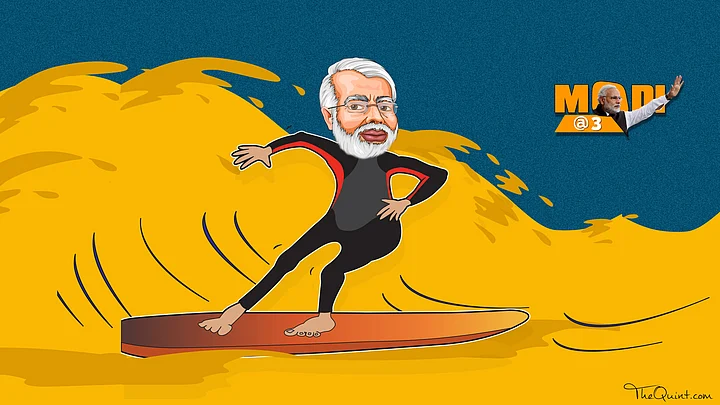In the three years that the Narendra Modi government has been in power, the Indian economy has grown at over 7 percent. We have surpassed China as the fastest-growing country in the world. The IMF has called India “the only ray of hope” in an otherwise uncertain and gloomy economic environment.
Within seven months of Modi taking oath, crude oil prices fell by half from $105/bbl levels to $55/bbl levels. It reached a low point of $30/bbl in January 2016 and is currently hovering at $49/bbl levels. Crude occupies a significant position in our economy with 87 percent of our requirements imported in FY2016.
Fall in India’s Import Bill
The decline in crude prices has led to a significant reduction in import bill from Rs 8.6 lakh crore in FY14 to Rs 4.7 lakh crore in FY17, resulting in savings of approximately Rs 8-10 lakh crore. This amount has been utilised for infrastructure spending, increase in NREGA allotment and other welfare schemes.
Since crude bill is paid in dollars, this has led to a saving of foreign exchange of $150 odd billion in the last three years. The bulk of the increase in forex reserves from May 2014 to current date is on account of the above.
The decline in crude prices has had a significant impact on inflation.
This has resulted in an increase in disposable income of Indians by 3.3 percent of GDP as per an IMF report, which in turn has provided a boost to private consumption.
Also Read: Petrol Price Cut by Rs 2.16 a Litre, Diesel by Rs 2.10
Benefits of Low Crude Prices
Low inflation has given leeway to central bank to reduce interest rates. The repo rate, which was 8 percent in May 2014, has now reduced to 6.25 percent. This has led to a reduction in home loan, car loan, and corporate’s loan rates.
For example, home loan rate for SBI has declined from 10.25 percent p.a. as of March 2014 to 8.35 percent p.a. now. All this has resulted in credit growth of 12.6 percent in FY15 & 10.7 percent in FY16.
Low crude prices have allowed the government to increase special excise duty on petrol and diesel by keeping the prices of fuels the same as when Modi took oath. While crude oil price, inclusive of adverse exchange rate movement, has declined by 49 percent, petrol prices have reduced only by 8.5 percent.
Gains for the Govt
The excise duty on petrol which was Rs 9.5/litre when Modi government came to power, has more than doubled to Rs 21.5/litre currently. This is akin to cheating customers, prices should have been decreased in line with decline in global crude oil prices. Anyway, this has resulted in windfall gains of Rs 2.5-3 lakh crore to the GoI.
Low crude prices have also helped the government deregulate diesel prices and cap subsidy on LPG. All this has led to a significant decline in petroleum subsidy bill from Rs 65,000 crore in FY14 to Rs 27,000 crore in FY17. Lower subsidies have dramatically improved the financial health of state-owned oil marketing companies (OMCs). The combined net profit of 3 OMCs on a standalone basis was around Rs 12,000 crore. This has jumped to around Rs 25,500 crore for FY17. Higher profits have ensured higher dividends to GoI.
On an aggregate, Rs 11-13 lakh crore have been savings/additional receipts to the Modi government on account of low crude oil prices. This accounts for around 3 percent of aggregate GDP of FY15-17.
The higher excise duty receipts have helped GoI maintain its fiscal deficit targets. If excise duty was not increased taking advantage of low crude oil price scenario, then fiscal deficit as a percentage of GDP would have been 4.25-4.5 percent vs 3.9 percent in FY16 and 3.5 percent budgeted for FY17.
Also Read: Guess Who’s Ready to Deliver Petrol and Diesel to Your Home?
Missed a Golden Opportunity?
To sum up, low crude prices have been a boon for the Indian economy. It has positively impacted different aspects of Indian economy and acted as lever for growth. It has helped India maintain its investment grade credit rating. Lady luck is definitely smiling on Mr Modi. This doesn’t take away, though, the steps taken by Modi government to improve ease of doing business and increase investors’ confidence in the Indian economy.
GoI may have missed a trick here. Reducing fuel prices in line with decline in crude oil rates would have left significant amount of money in the pocket of Indians as seen above (Rs 2.5-Rs. 3 lakh crore) accounting for 1.5 percent of private final consumption expenditure. This would have had a spiraling effect on consumption and investment leading to higher growth.
Also Read: Modi@3: With 2019 in Sight, Await More Politics & Less Governance
(Amitabh Tiwari is a corporate & investment banker turned political commentator, strategist and consultant. He can be reached @politicalbaaba. This is an opinion piece and the views expressed above are the author’s own. The Quint neither endorses nor is responsible for the same.)
